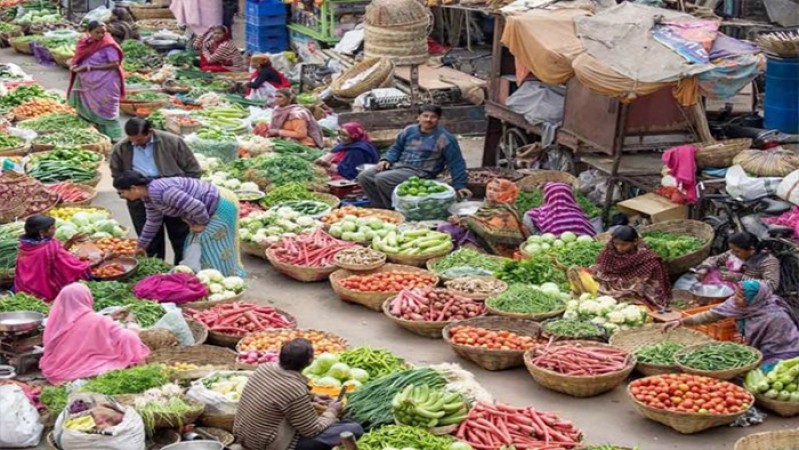
New Delhi: In a worrisome economic trend, India's wholesale prices have remained in deflationary territory for the third successive month, indicating ongoing downward pressure on prices across various sectors. The prolonged deflationary phase raises concerns about the state of the Indian economy and its ability to generate sustainable growth.
The Wholesale Price Index (WPI), which measures the average change in the prices of goods at the wholesale level, recorded a deflation of 1.81% in the month of June. This followed deflationary figures of 3.37% in May and 1.57% in April, illustrating a sustained downward trend in prices.
The persistent deflationary environment can be attributed to several factors. First, the COVID-19 pandemic has disrupted supply chains, leading to reduced demand and excess inventory. This has resulted in lower prices as businesses strive to clear their stock and maintain cash flow.
Second, weak consumer sentiment and subdued economic activity have further contributed to the deflationary pressures. Consumers have tightened their spending amid income uncertainties, causing a slowdown in demand for goods and services. This, in turn, puts downward pressure on prices as businesses adjust their pricing strategies to attract customers.
The deflationary trend is pervasive across various sectors. In June, fuel and power prices registered a deflation of 10.62%, while manufacturing products saw a deflation of 2.59%. Primary articles, including food and non-food items, recorded a mild deflation of 0.29%. These figures highlight the broad-based nature of the deflationary pressures affecting the Indian economy.
The prolonged period of deflation raises concerns for policymakers. While deflation can benefit consumers by reducing the cost of goods, it poses challenges for businesses and the overall economy. Persistent deflation can lead to reduced profitability, lower investments, and job losses, hampering economic growth and recovery.
Also read:SC Sets Hearing Date for Sisodia's Interim Bail Plea in COVID-19 Protocol Violation Case
The Reserve Bank of India (RBI), the country's central bank, has been closely monitoring the deflationary trends. In response to the prolonged deflationary phase, the RBI has maintained an accommodative monetary policy stance, aiming to support economic activity and ensure price stability.
To counter the deflationary pressures and stimulate economic growth, the Indian government has implemented various measures. These include fiscal stimulus packages, reforms to attract investment, and initiatives to enhance domestic consumption. The effectiveness of these measures in reversing the deflationary trend remains to be seen.
The outlook for the Indian economy in terms of inflation and growth will depend on several factors. The pace of economic recovery, the trajectory of the COVID-19 pandemic, and global commodity prices will all play a crucial role in determining future price movements.
Also read:PV Sindhu and Lakshya Sen Continue Strong Run at US Open, Reach Quarterfinals
Economists and experts are closely watching the inflationary dynamics in the coming months. While some anticipate a gradual return to inflationary territory as economic activity picks up, others remain cautious due to the prevailing uncertainties and the potential for a prolonged deflationary phase.
Addressing the deflationary pressures requires a multifaceted approach. Efforts to revive consumer demand, boost investment, and enhance productivity will be critical. Moreover, a sustained economic recovery, supported by structural reforms and prudent macroeconomic policies, will be essential for achieving stable and sustainable growth.
In conclusion, India's wholesale prices remaining in deflationary territory for the third successive month is a concerning economic trend. The prolonged deflation raises challenges for businesses, the labor market, and overall economic growth. It calls for concerted efforts from policymakers, including monetary and fiscal measures, to stimulate demand and restore price stability. The path to recovery will require a comprehensive approach and a focus on bolstering consumer confidence, attracting investment, and promoting productivity in the Indian economy.